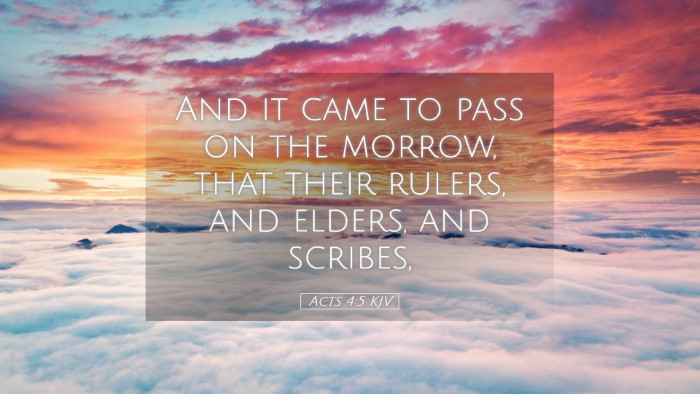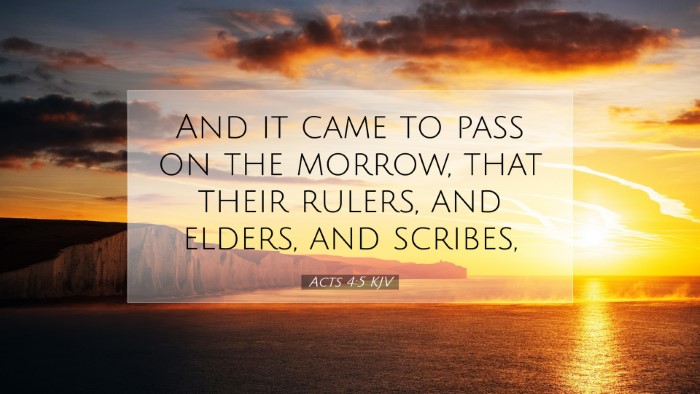Commentary on Acts 4:5
Acts 4:5 states: “And it came to pass on the morrow, that their rulers, and elders, and scribes,” elucidating the environment of the early Church and the unfolding of God’s plan through His apostles.
Contextual Background
The events leading to Acts 4:5 occur after Peter and John heal a lame man at the temple, an act that ignited the attention of the Jewish authorities. The apostles are arrested, inciting the proceedings that reveal both the hostility and eventual acceptance of the gospel message.
Matthew Henry's Commentary Insights
Matthew Henry emphasizes the significance of this gathering of the Jewish leaders. He suggests that this assembly reflects the unity of opposition against the apostles and the spread of the gospel. He notes:
- Authority Figures: The “rulers, and elders, and scribes” represent the entire Jewish leadership, showcasing the collective effort to suppress the apostolic message.
- Divine Providence: Henry underscores the event as a part of God’s sovereign plan, demonstrating how God can use opposition to glorify His name and to further the gospel.
Albert Barnes' Commentary Insights
Albert Barnes provides a detailed look at the societal and religious implications of this verse:
He highlights:
- Legal Assembly: This was a formal inquiry, a judicial process, showing both the seriousness of the accusations against the apostles and the authority of the Sanhedrin to investigate religious matters.
- Power Dynamics: Barnes points out the power held by religious leaders, reflecting the early Church's struggle against established institutions. This dynamic serves as a significant historical reference for understanding the challenges of maintaining faith amidst institutional opposition.
Adam Clarke's Commentary Insights
Adam Clarke's analysis adds further dimensions to the understanding of Acts 4:5:
- Historical Context: Clarke discusses the historical significance of the Sanhedrin, noting that it comprised seventy-one members who were charged with judicial authority in Jerusalem.
- Theological Implication: Clarke emphasizes the theological ramifications of the apostles' boldness in the face of opposition as a demonstration of their faith and the power of the Holy Spirit. Their willingness to confront these authorities points to the transformative nature of the gospel.
Key Themes and Lessons
Acts 4:5 not only focuses on a specific historical event; it conveys rich themes applicable for modern readers, particularly for pastors, students, and theologians:
- Faith Under Fire: The boldness of Peter and John serves as a powerful reminder of the strength derived from faith, especially when confronting societal or institutional challenges.
- Unity of Opposition: The gathering of diverse leaders illustrates the collective resistance to the gospel. This teaches the importance of recognizing that opposition may come from unexpected places, necessitating prayer and unity among believers.
- Responding to Authority: The conduct of the apostles in this passage highlights the appropriate balance between respect for authority and the unwavering commitment to the truth of the gospel.
- Divine Purpose in Adversity: The verse speaks to God’s ability to use conflict for divine purposes, transforming trials into opportunities for witness and testimony about His power.
Conclusion
Acts 4:5, within its full context, becomes a crucial text in understanding the emergence of the early Church amidst resistance. The insights from Matthew Henry, Albert Barnes, and Adam Clarke collectively paint a picture of the interplay between faith, authority, and divine purpose.
As readers engage with this passage, may they find inspiration and encouragement to stand firm in their faith and to boldly proclaim the gospel even in the face of opposition.


